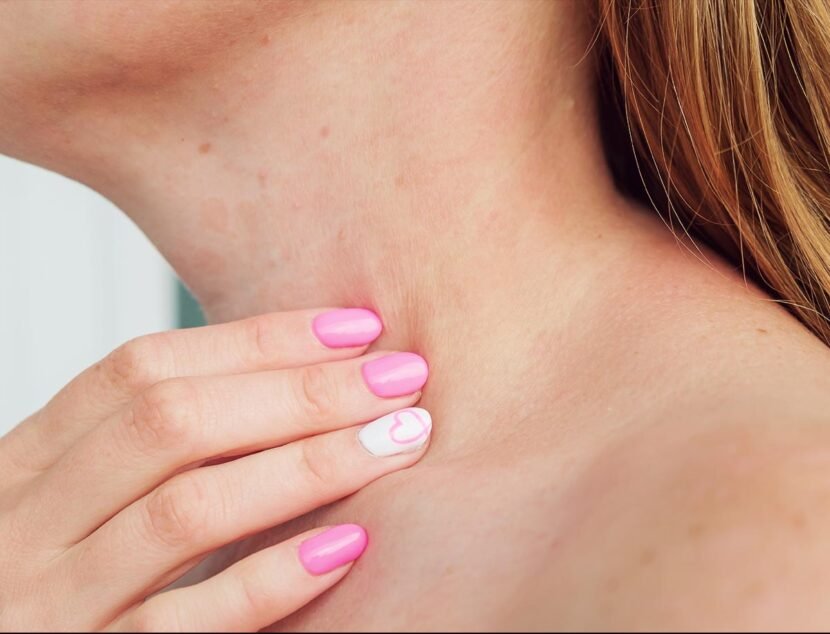Neck eczema, a form of atopic dermatitis, is a chronic skin condition characterized by red, itchy, and inflamed patches on the skin. While it can affect any part of the body, its occurrence on the neck can be particularly uncomfortable and visible. Eczema is known for its cyclical nature, with periods of flare-ups followed by periods of remission.
Although it can affect individuals of all ages, it is most prevalent in children. The exact etiology of eczema remains unclear, but it is believed to result from a combination of genetic predisposition and environmental factors. A family history of eczema or other allergic conditions such as asthma or hay fever is common among those affected.
It is important to note that eczema is not contagious and cannot be transmitted through physical contact. The condition typically manifests as dry, scaly skin that can become red, inflamed, and intensely itchy. Scratching the affected areas can exacerbate irritation and potentially lead to secondary infections.
While there is no cure for eczema, various treatment options are available to manage symptoms and prevent flare-ups. Effective management of neck eczema requires a comprehensive understanding of its symptoms, triggers, and available treatments. With proper care and knowledge, individuals with neck eczema can significantly improve their quality of life and effectively manage the condition.
Key Takeaways
- Neck eczema is a common skin condition characterized by red, itchy, and inflamed patches on the neck.
- Common symptoms of neck eczema include dry, scaly skin, redness, itching, and sometimes oozing or crusting.
- Triggers and causes of neck eczema can include irritants, allergens, stress, and genetic factors.
- Effective treatment options for neck eczema may include moisturizing creams, topical corticosteroids, and antihistamines.
- Managing itchy skin associated with neck eczema can be done through regular moisturizing, avoiding triggers, and using gentle skincare products.
Common Symptoms of Neck Eczema to Look Out For
Physical Symptoms
The most common symptom of neck eczema is an itchy rash that can appear on the front or back of the neck. The rash may be red, inflamed, and scaly, and it can be accompanied by dry, rough skin. In some cases, the affected skin may also develop small fluid-filled blisters that can ooze and crust over. The constant itching and scratching of the affected area can lead to further irritation and even infection.
Emotional Impact
In addition to the physical symptoms, neck eczema can also have a significant impact on a person’s emotional well-being. The constant discomfort and visible rash can cause embarrassment and self-consciousness, leading to feelings of anxiety and low self-esteem.
Seeking Support and Treatment
It is important for those with neck eczema to seek support from friends, family, and healthcare professionals to help manage the emotional impact of the condition. By being aware of the common symptoms of neck eczema, individuals can seek appropriate treatment and care to alleviate discomfort and improve their quality of life.
Triggers and Causes of Neck Eczema
There are several factors that can trigger or exacerbate neck eczema. Common triggers include irritants such as soaps, detergents, and perfumes, as well as allergens like pet dander, pollen, and dust mites. Changes in temperature or humidity, stress, and sweating can also trigger flare-ups of neck eczema.
Understanding these triggers can help individuals with neck eczema take steps to avoid them and minimize their impact on their skin. The exact cause of eczema is not fully understood, but it is believed to be a combination of genetic and environmental factors. People with eczema often have a family history of the condition or other allergic conditions such as asthma or hay fever.
Eczema is also associated with a malfunction in the body’s immune system, which leads to inflammation and an overreaction to certain triggers. While the exact cause of eczema may not be known, identifying and avoiding triggers can help manage symptoms and prevent flare-ups.
Effective Treatment Options for Neck Eczema
While there is no cure for eczema, there are several effective treatment options available to help manage symptoms and prevent flare-ups. Topical corticosteroids are commonly prescribed to reduce inflammation and itching associated with eczema. These medications come in various strengths and formulations, so it is important to use them as directed by a healthcare professional.
In addition to corticosteroids, moisturizers are an essential part of managing neck eczema. Keeping the skin well-hydrated can help reduce dryness and itching. For more severe cases of neck eczema, oral medications or phototherapy may be recommended by a healthcare professional.
Oral medications such as antihistamines or immunosuppressants can help control itching and inflammation from within the body. Phototherapy involves exposing the skin to controlled amounts of natural or artificial ultraviolet light under medical supervision. This treatment can help reduce inflammation and itching associated with eczema.
In addition to medical treatments, there are also natural remedies and lifestyle changes that can help manage neck eczema. For example, using fragrance-free skincare products, avoiding harsh soaps and detergents, and wearing soft, breathable fabrics can help minimize irritation and reduce flare-ups. It is important for individuals with neck eczema to work closely with a healthcare professional to develop a personalized treatment plan that addresses their specific needs and concerns.
Managing Itchy Skin Associated with Neck Eczema
Itchy skin is one of the most uncomfortable symptoms of neck eczema. The constant urge to scratch can lead to further irritation and even infection. Managing itchy skin associated with neck eczema requires a multi-faceted approach that addresses both the physical and emotional aspects of the condition.
One of the most important steps in managing itchy skin is to avoid scratching as much as possible. This can be challenging, especially when the itching is severe, but scratching can further damage the skin and lead to more itching. Using moisturizers regularly can also help manage itchy skin associated with neck eczema.
Keeping the skin well-hydrated can reduce dryness and itching, providing relief from discomfort. Cold compresses or ice packs can also help alleviate itching by numbing the affected area and reducing inflammation. In some cases, over-the-counter antihistamines may be recommended to help control itching associated with neck eczema.
In addition to these physical measures, managing itchy skin also involves addressing the emotional impact of the condition. Itchy skin can be distressing and disruptive to daily life, leading to feelings of frustration and anxiety. Seeking support from friends, family, or a mental health professional can help individuals cope with the emotional challenges of managing itchy skin associated with neck eczema.
Lifestyle Changes to Help Prevent Neck Eczema Flare-ups
Identifying and Avoiding Triggers
One important lifestyle change is to identify and avoid triggers that exacerbate eczema symptoms. This may involve using fragrance-free skincare products, avoiding harsh soaps and detergents, and wearing soft, breathable fabrics.
Maintaining a Consistent Skincare Routine
It is also important to maintain a consistent skincare routine that includes regular moisturizing to keep the skin well-hydrated. This can help prevent neck eczema flare-ups and improve overall skin health.
Managing Stress and Maintaining Overall Health
In addition to skincare changes, managing stress can also help prevent neck eczema flare-ups. Stress is known to exacerbate eczema symptoms, so finding healthy ways to cope with stress such as exercise, meditation, or relaxation techniques can be beneficial for those with neck eczema. Eating a balanced diet rich in fruits, vegetables, lean proteins, and healthy fats can also support overall skin health and reduce inflammation associated with eczema. Finally, maintaining good overall health through regular exercise, adequate sleep, and avoiding smoking or excessive alcohol consumption can also contribute to preventing neck eczema flare-ups. By making these lifestyle changes, individuals with neck eczema can take proactive steps to manage their condition and improve their quality of life.
Seeking Professional Help for Severe Neck Eczema Cases
For severe cases of neck eczema that do not respond to over-the-counter treatments or lifestyle changes, it is important to seek professional help from a healthcare provider. A dermatologist or allergist can provide a thorough evaluation of the condition and recommend appropriate treatment options based on individual needs. This may include prescription medications such as topical corticosteroids or oral antihistamines, as well as advanced treatments like phototherapy.
In some cases, severe neck eczema may require a multidisciplinary approach involving various healthcare professionals such as dermatologists, allergists, and mental health professionals. This comprehensive approach can address both the physical symptoms of eczema as well as the emotional impact it may have on an individual’s well-being. It is important for individuals with severe neck eczema to seek professional help early on to prevent complications such as infection or scarring.
By working closely with healthcare professionals, individuals with severe neck eczema can receive personalized care that addresses their specific needs and concerns. Seeking professional help is an important step in effectively managing severe cases of neck eczema and improving overall quality of life.
FAQs
What are the symptoms of neck eczema?
The symptoms of neck eczema may include redness, itching, dryness, and flaking of the skin on the neck. In some cases, the skin may also become swollen, cracked, or blistered.
What are the common triggers for neck eczema?
Common triggers for neck eczema may include irritants such as soaps, detergents, and perfumes, as well as allergens like pet dander, pollen, and certain foods. Other triggers may include stress, sweating, and changes in temperature.
How is neck eczema diagnosed?
Neck eczema is typically diagnosed by a healthcare professional based on the appearance of the skin and a review of the patient’s medical history. In some cases, a patch test may be performed to identify specific allergens that may be triggering the eczema.
What are the treatment options for neck eczema?
Treatment options for neck eczema may include moisturizing creams or ointments, topical corticosteroids, antihistamines, and avoiding known triggers. In some cases, phototherapy or oral medications may be prescribed by a healthcare professional.
Can neck eczema be prevented?
While it may not be possible to completely prevent neck eczema, individuals can reduce their risk by avoiding known triggers, using gentle skincare products, and keeping the skin well moisturized. It is also important to manage stress and maintain a healthy lifestyle.




